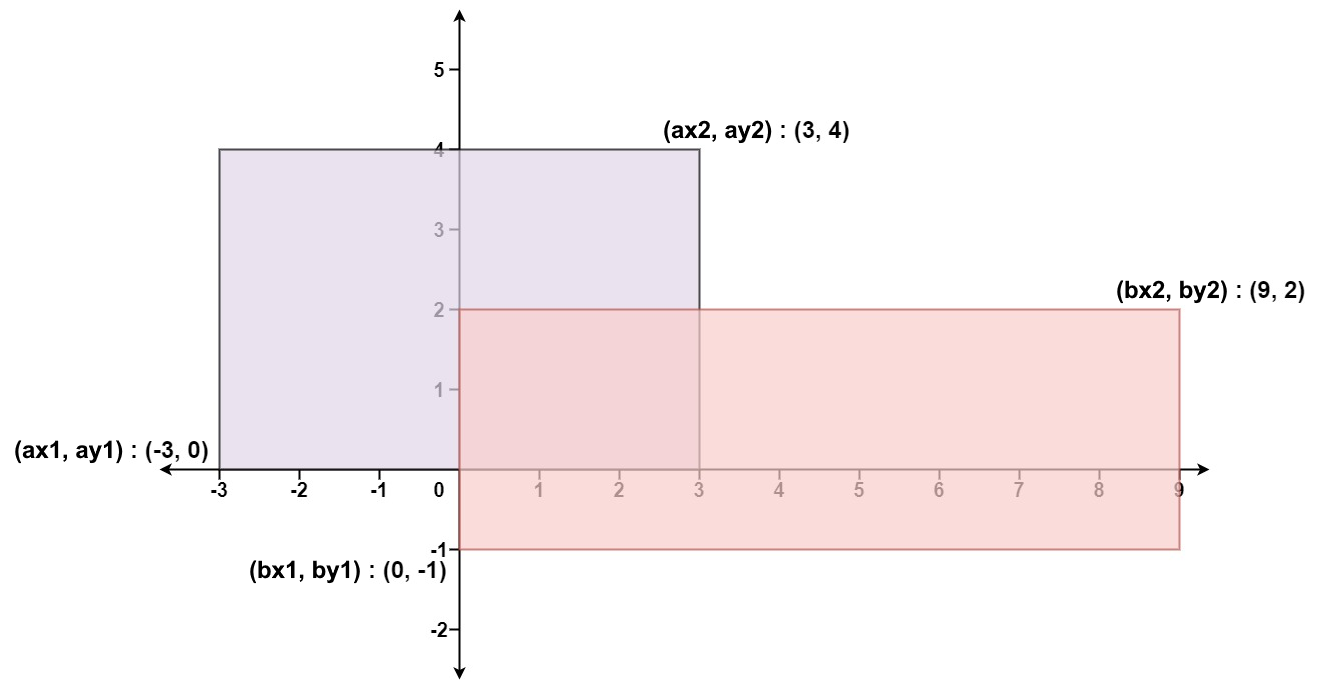Given the coordinates of two rectilinear rectangles in a 2D plane, return the total area covered by the two rectangles.
The first rectangle is defined by its bottom-left corner (ax1, ay1) and its top-right corner (ax2, ay2).
The second rectangle is defined by its bottom-left corner (bx1, by1) and its top-right corner (bx2, by2).
Example 1:
Input: ax1 = -3, ay1 = 0, ax2 = 3, ay2 = 4, bx1 = 0, by1 = -1, bx2 = 9, by2 = 2 Output: 45
Example 2:
Input: ax1 = -2, ay1 = -2, ax2 = 2, ay2 = 2, bx1 = -2, by1 = -2, bx2 = 2, by2 = 2 Output: 16
Constraints:
-104 <= ax1 <= ax2 <= 104-104 <= ay1 <= ay2 <= 104-104 <= bx1 <= bx2 <= 104-104 <= by1 <= by2 <= 104
First, we calculate the area of the two rectangles separately, denoted as
The time complexity is
class Solution:
def computeArea(
self,
ax1: int,
ay1: int,
ax2: int,
ay2: int,
bx1: int,
by1: int,
bx2: int,
by2: int,
) -> int:
a = (ax2 - ax1) * (ay2 - ay1)
b = (bx2 - bx1) * (by2 - by1)
width = min(ax2, bx2) - max(ax1, bx1)
height = min(ay2, by2) - max(ay1, by1)
return a + b - max(height, 0) * max(width, 0)class Solution {
public int computeArea(int ax1, int ay1, int ax2, int ay2, int bx1, int by1, int bx2, int by2) {
int a = (ax2 - ax1) * (ay2 - ay1);
int b = (bx2 - bx1) * (by2 - by1);
int width = Math.min(ax2, bx2) - Math.max(ax1, bx1);
int height = Math.min(ay2, by2) - Math.max(ay1, by1);
return a + b - Math.max(height, 0) * Math.max(width, 0);
}
}class Solution {
public:
int computeArea(int ax1, int ay1, int ax2, int ay2, int bx1, int by1, int bx2, int by2) {
int a = (ax2 - ax1) * (ay2 - ay1);
int b = (bx2 - bx1) * (by2 - by1);
int width = min(ax2, bx2) - max(ax1, bx1);
int height = min(ay2, by2) - max(ay1, by1);
return a + b - max(height, 0) * max(width, 0);
}
};func computeArea(ax1 int, ay1 int, ax2 int, ay2 int, bx1 int, by1 int, bx2 int, by2 int) int {
a := (ax2 - ax1) * (ay2 - ay1)
b := (bx2 - bx1) * (by2 - by1)
width := min(ax2, bx2) - max(ax1, bx1)
height := min(ay2, by2) - max(ay1, by1)
return a + b - max(height, 0)*max(width, 0)
}function computeArea(
ax1: number,
ay1: number,
ax2: number,
ay2: number,
bx1: number,
by1: number,
bx2: number,
by2: number,
): number {
const a = (ax2 - ax1) * (ay2 - ay1);
const b = (bx2 - bx1) * (by2 - by1);
const width = Math.min(ax2, bx2) - Math.max(ax1, bx1);
const height = Math.min(ay2, by2) - Math.max(ay1, by1);
return a + b - Math.max(width, 0) * Math.max(height, 0);
}public class Solution {
public int ComputeArea(int ax1, int ay1, int ax2, int ay2, int bx1, int by1, int bx2, int by2) {
int a = (ax2 - ax1) * (ay2 - ay1);
int b = (bx2 - bx1) * (by2 - by1);
int width = Math.Min(ax2, bx2) - Math.Max(ax1, bx1);
int height = Math.Min(ay2, by2) - Math.Max(ay1, by1);
return a + b - Math.Max(height, 0) * Math.Max(width, 0);
}
}